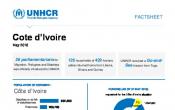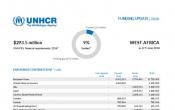Côte d'Ivoire
Operation: Côte d'Ivoire
Location
{"longitude":-6,"latitude":8,"zoom_level":7,"iso_codes":"'CIV'"}
By clicking on the icons on the map, additional information is displayed.
Key Figures
| 2017 year-end figures | |
| 8,270 | Ivorian refugees returned to Côte d’Ivoire and were assisted to sustainably restart their lives back home |
| 3,570 | individuals received nationality certificates, of which 1,783 were stateless persons who obtained Ivorian nationality |
| 350 | children (194 boys and 156 girls) were assisted to attend primary and secondary school |
| 8 | refugees were awarded DAFI scholarships to access higher education |
| 2018 planning figures | |
| 8,800 | stateless persons will be registered and issued documentation through the procedure for late birth registration |
| 1,280 | refugee returnees will receive shelter support |
| 1,280 | refugee returnees will receive production kits or inputs for agriculture/livestock/fisheries activities |
| 500 | refugees and refugee returnees with specific needs will receive material support |
| 4 | joint field missions with donors will be conducted |
People of Concern
30%
Decrease in
2016
2016
| 2016 | 715,353 |
| 2015 | 1,023,579 |
| 2014 | 739,014 |

[["Refugees",1399],["Asylum-seekers",284],["Returned refugees",19552],["Stateless",694000],["Others of concern",118]]
Loading ...
Côte d'Ivoire
< Back
2017
{"categories":[2013,2014,2015,2016,2017,2018],"budget":[27.8455643,27.245166635,26.54975356,30.78501955,20.258448214,16.30000147],"expenditure":[15.61798496,13.36914223,9.28496264,14.39998206,10.84026725,null]}
{"categories":[2013,2014,2015,2016,2017,2018],"p1":[20.02234024,15.644387895,15.03323275,10.38524445,7.03383859,2.71570462],"p2":[1.80919191,2.71130599,3.59930438,3.99044151,4.15883048,9.63001234],"p3":[4.63222311,8.88947275,7.91721643,16.40933359,9.065779144,3.95428451],"p4":[1.38180904,null,null,null,null,null]}
{"categories":[2013,2014,2015,2016,2017,2018],"p1":[11.52592771,7.72297774,4.70827247,10.07240248,5.02392262,null],"p2":[1.18513842,1.48255059,2.07055165,1.69819924,1.91388337,null],"p3":[2.08293505,4.1636139,2.50613852,2.62938034,3.90246126,null],"p4":[0.82398378,null,null,null,null,null]}
Loading ...
CHOOSE A YEAR
- 2014
- 2015
- 2016
- 2017
- 2018
Operational context
Côte d'Ivoire has gradually emerged from the most recent civil war of 2010 and 2011, though efforts are still required in some key areas like the transitional justice, strengthening social cohesion, and security sector reform.In 2017, UNHCR continued its work with other UN agencies under the “Delivering as One” initiative, supporting the Government at various levels in its efforts to achieve the SDGs, work towards local integration for protracted refugees in Côte d’Ivoire and promote reintegration of Ivorian returnees.
At the end of 2017, some 27,000 Ivorian refugees remained outside the country, of which approximately 11,000 were in Liberia, some 6,600 in Ghana, some 4,500 in Guinea, over 2,000 in Togo, and small numbers in other countries.
The national law on asylum that enshrines specific rights for refugees, including access to higher education and naturalization, was not adopted in 2017 and UNHCR will therefore continue its advocacy for adoption of this law in 2018.
Also the National Action Plan to eradicate statelessness was not yet adopted. The document, which was drafted in 2016, contains nine actions of which some were already implemented in 2017. The domestication of the two international conventions on statelessness, ratified by Côte d’Ivoire in 2013, is still underway. The application of Article 3 of the Nationality Code, focusing on the primacy of international conventions over national legislation, is also not yet effective but UNHCR continued its advocacy throughout 2017.
Population trends
At the end of 2017, the people of concern to UNHCR in Côte d’Ivoire included:- Close to 1,600 registered refugees of whom around 80 per cent were from the Central African Republic and Liberia living in urban areas. In addition, there were some 380 asylum-seekers;
- 8,270 Ivoirians who were repatriated from neighboring countries, mainly from Liberia (92 per cent). The remaining 8 per cent returned from Ghana, Guinea, Mali and Togo;
- Of the 700,000 persons in Côte d’Ivoire who were reported as stateless at the end of 2015, 692,000 remained stateless at the end of 2017.
Key Achievements
- 41 refugees were assisted with income generation/micro-credit support, and 17 resettlement cases of 60 people were submitted to the regional office for approval. One case of 8 individuals departed to Canada in November 2017.
- UNHCR continued advocacy for adoption of the National Action Plan to eradicate statelessness and domestication of the two international conventions on statelessness, ratified by Côte d’Ivoire in 2013.
- On prevention and eradication of statelessness, UNHCR also facilitated the creation of two new networks: for parliamentarians and for journalists which together with the NGO coalition against statelessness form a solid base for supporting all law and policy initiatives as well as advocacy work. Partnerships were also developed with the National Commission on Human Rights (CNDHCI) and the University of Bouake.
- With regard to the reintegration of Ivorian returnees, two health centers were restored which provide health services to both returnees and host community. Shelter for 278 and latrines for 1,390 people were also built, ensuring access to secure and dignified housing upon return. All Ivorian returnees also received a return package, containing a three-month food ration from WFP and a cash grant from UNHCR.
- 15 educational facilities in need of restoration were identified and selected through an integrated selection procedure conducted in collaboration with administrative authorities and the IEP. More than 6,300 people were sensitized about social cohesion through awareness-raising activities.
- 14 survivors of SGBV, including three cases of child rape, were identified by women and community leaders and referred to the relevant structures, including to medical services, judicial institutions, and psychosocial centers.
Unmet needs
- Only 8 scholarships for higher education, out of the 30 applications received, were granted.
- Due to insufficient resources, access to healthcare for refugees could only be provided to those with specific needs.
- Only 41 out of 162 applications for microcredit support were granted.
- The mapping exercise of stateless persons in Côte d’Ivoire scheduled for 2017 did not take place due to insufficient resources. The project has now been rescheduled for 2018.
- The return planning figure for 2017 stood at 16,000 individuals but only 8,270 returned to Côte d’Ivoire during the year.
Working environment
Côte d'Ivoire is gradually emerging from 2010-2011 political crisis and consolidating its gains. More efforts are required in some important areas, including transitional justice, strengthening social cohesion, and security sector reforms. The Government plays its role in facilitating work with communities for sustainable reintegration, including reintegration of children into the education system, and facilitating access to basic services, property and land.Côte d’Ivoire hosts the largest population at risk of statelessness in West Africa. UNHCR is supporting the Government in reduction of statelessness under the special declaration law and prevention of statelessness through issuance of late birth certificates by mobile courts.
Côte d’Ivoire has a generous open door policy for refugees and asylum-seekers. UNHCR is working with the Government for adoption of the draft National Asylum Law to strengthen the national legal framework and to domesticate the international instruments in order to address the protection needs of refugees and asylum-seekers.
Key priorities
In 2017, UNHCR’s operation will focus on:• Reception and smooth reintegration of returning Ivorian refugees, together with the Government and development actors. Under the durable solution strategy for Ivorian returnees, UNHCR Côte d’Ivoire expects to receive around 11,000 people from among remaining Ivorian refugees in neighbouring countries under its voluntary repatriation programme. Returnees will receive a repatriation package on arrival and targeted assistance through reintegration and reconciliation activities;
• Prevention and reduction of statelessness will remain a high priority in 2017, and the Office will redouble its efforts to implement statelessness strategy for reduction and prevention of statelessness in the country;
• Provision of protection and assistance to refugees and asylum seekers in the country. The refugee protection strategy will focus on the search for durable solutions (repatriation, reintegration, and resettlement). The Government will continue refugee status determination through eligibility and appeal committees. UNHCR will advocate the adoption of the draft revised law on asylum, and will strive for the protection of refugees.


